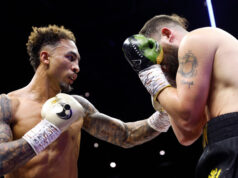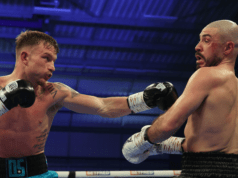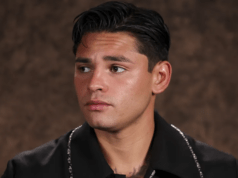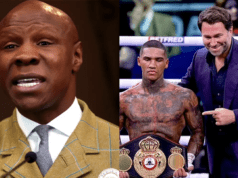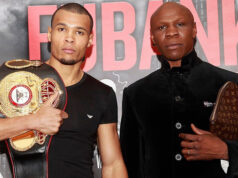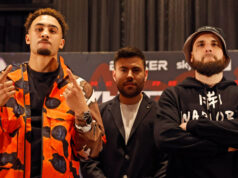Before 2012 United States Olympians Dominic Breazeale, Marcus Browne, Terrell Gausha, Errol Spence and Rau’Shee Warren turn professional this Friday, November 9, at Fantasy Springs Resort Casino in Indio, Calif., on a special edition of ShoBox: The Next Generation (SHOWTIME, 10:00 p.m. ET/PT), the fighters took time to reflect on their upcoming bouts and what it means to start their quests to become future world champions.
Breazeale will face Curtis Tate of Oakland, TN (4-3, 4 KO’s), Browne will face Codale Ford of Ford Gibson, OK (2-0), Gausha will face Dustin Caplinger of Chillicothe, OH (2-3, 1 KO), Spence will face Jonathan Garcia of Aguadilla, Puerto Rico (3-3, 1 KO) and Warren will face Luis Rivera of Ponce, Puerto Rico (1-2).
2012 UNITED STATES OLYMPIAN Q&A:
What do you think will be your greatest strengths/attributes as a pro?
DB: My strengths as a professional will be my presence in the ring. I’ll be the bigger, stronger, faster boxer. I also have developed a strong controlling jab.
MB: My greatest strength will be my power and professional style of boxing.
TG: I think my greatest attributes as a pro will be my ability to think and keep a level head in pressure situations.
ES:My combination punches, defense, my composure and ability to adjust in the ring.
RW: My hand speed and my footwork because speed equals power.
Since starting to train for your pro debut, what has been the biggest surprise or adjustment you’ve had to make?
DB: There hasn’t really been much of a surprise or adjustment. The only thing that changed is that training got that much harder. My training went from using the 3 minute bell for roughly 20 rounds to just working 90 minutes straight and getting water when you need it. Of course sparring is now 6 to 8 rounds long when it used to be 3 to 5 rounds, but I expected that to happen.
MB: The biggest adjustment is just sticking to the game plan and executing no matter what happens during the course of a match.
TG: Nothing has really surprised me because I have been working with pros for a while now, but I think an adjustment that I definitely have to make is the pace.
ES: I think I had a pro style in the amateurs, so really just picking my shots better and taking off the headgear.
RW: The biggest adjustments will be just staying patient, calming down, taking my time and picking my shots.
Do you have something to prove? If so, what?
DB: Every time I get in the ring, I have something to prove. I want to prove to fans and supporters that as an amateur I was good, but as a pro I will be great. I love proving people wrong. They said four years ago “he can’t box, he’ll never make it.” I think that really drove me to becoming an Olympian. Once you are an Olympian, you are always an Olympian (never former, never past). The only thing left to prove is that I’m the champ. I can hear it now “and the new heavyweight champ!”
MB: I think I have something to prove to both my supporters and myself. Besides that, I just have do what I do best.
TG: I want to prove that I am a force in the middleweight division and not to be overlooked.
ES: Yes I think I have a lot to prove, just coming in as an Olympian, there are high expectations from others and I want to be known as one of the greatest, so I have high expectation for myself as well.
RW: At this stage with me being a three-time Olympian, the fans will be watching to see what I can do because I’m a pro now and I’ve been an amateur for so long. I don’t have anything to prove to myself, but to others maybe.
What distinguishes yourself from your Olympic teammates?
DB: I’m not your ordinary professional debuting boxer. I say this because I’m a married man with two kids. Yup, married to my beautiful wife Christina for 5 years and I have 2 sons. My oldest DeAngelo is 4 and Devin is 9 months. I also have a college degree in criminal justice from the University of Northern Colorado. I started as a college Division 1 quarterback at the University of Northern Colorado. Football has always been a part of my life since I was 5 years old, but boxing, on the other hand, has only been in my life for the last four years. Prior to June of 2008, I never boxed before.
MB: I feel like I bring pizazz and a breath of fresh air to the light heavyweight division, but I’d rather let my fists do the talking.
TG: I think one thing that distinguishes myself from the rest of my Olympic teammates is my will to win, not to take anything away from them.
ES: Personality wise, I’m probably more laid back and quiet than the rest of my teammates.
RW: The only thing is that I’ve been to the Olympics three times, but in the ring, we’re all the same, we’re all human.
Is there more pressure on you on the eve of your pro debut than when you were fighting as an amateur?
DB: Of course there is more pressure on the eve of my professional debut, but I think it will help me more then it could harm me. The pressure will keep me on my toes, aware and alert.
MB: No not at all. I’ve been on the world stage at the Olympic Games so that experience was very helpful. I’m just going to have fun and not worry about what others think.
TG: I really don’t think it’s more pressure. This is what we have been working our whole careers for, to reach this point. I’m doing what I love to do and having fun doing it…no pressure.
ES: There’s a bit more pressure, it being my pro debut and all, but it’s nothing I can’t handle. The goal has always been to win.
RW: No, not all. I feel more relaxed and more confident this time around. I feel like I should have done this a while ago, but I always had a dream of going to the Olympics and winning a medal. Now I have to focus on a new dream of becoming a world champion.
Have you ever had a fight without headgear? What do you think it will feel like when you don’t wear it as a pro?
DB: No, this is my first fight without headgear. I think the feeling will be great. I never really liked wearing headgear.
MB: No, I haven’t had a fight without headgear and that just means I have to work on my defense and not get hit, but in boxing when will you not get hit?
TG: I’ve had seven fights without headgear while competing in the World Series of Boxing and I honestly feel that it better suits me. I can see better and move more freely.
ES: I’ve never fought without headgear. That and the smaller gloves will be the only adjustment that that I will have to make. I’ll probably feel the punches more and be more vulnerable to cuts and head butts.
RW: I had eight fights in the World Series of Boxing so fighting without headgear won’t be new. In the WSB, there were a lot of things that were different: no shirt, a bigger cup and no headgear. It was really different at first, but now I feel like it’s going to be easier because I know what to expect. I know how to go in the ring and be comfortable. All those little things count.
Can you tell us something about yourself that no one really knows — habits, hobbies, superstitions, etc.?
DB: I love the look and sound of a saxophone and one day I’m going to teach myself how to play it like a pro. It’s always been a passion of mine and I just don’t understand why.
MB: I love shopping, buying & listening to music, helping others & putting on for my city (New York City/Staten Island).
TG: I always watch Sugar Ray Leonard and Andre Ward before my fights. I take bits and pieces of their style and add it to my own. They are two of my favorite fighters.
ES: I’m a laid back conservative guy, but I do like to dance and play video games.
RW: Sometimes I like to dance a little to warm up, especially if Adrien Broner is with me so you might see a few dance moves before I walk to the ring.
What will you do with your first professional boxing paycheck?
DB: My first paycheck will go straight to bills and whatever is left will go in savings. Remember I’m a family man I have big responsibilities. Family first.
MB: Of course, I have to pay rent to my mom and I’ll put some money into my 401k as well as my life insurance policy (I’m not planning in leaving anytime soon, though).
TG: The first thing I want to do with the money I receive from my first pro fight is put some aside for my daughter’s college fund.
ES: It’s going straight to the bank! I’m the cheap one on the team.
RW: I haven’t decided, but I know Christmas is coming up. I have two little boys and a daughter coming, so I have to get ready for that. I have kids to feed.
If there is one special material possession you could get from your success, what would it be?
DB: Of course I would love to be debt free for my wife, my kids, their kids and myself. As far as a special material possession, it would be the belt or should I say belts.
MB: It would be a great fan base and a great way of living meaning wealth, health & happiness. #GODIsGreat!
TG: I honestly want to own a house.
ES: My boxing shoes and ring attire from the Olympics. It was a once-in-a-lifetime experience in my life fighting in front of the world and representing my country with the world’s best athletes.
RW: Material possessions aren’t important to me, but I would like a Lamborghini…a red one.
ABOUT THE OLYMPIANS
A former quarterback for the University of Northern Colorado, 27-year-old Dominic Breazeale only began boxing three and a half years ago, but the 6-foot-6 heavyweight made an immediate impact, winning a U.S. national championship and earning a spot on the 2012 Olympic team. Opting to stay with the sweet science instead of returning to football, Breazeale has the raw talent and determination to give the United States a serious heavyweight threat in the coming years.
Three-time New York Golden Gloves, 2012 national and 2010 PAL champion Marcus Browne is a versatile light heavyweight southpaw who learned his craft in Staten Island, New York under the tutelage of Gary Stark Sr. and Teddy Atlas. Able to box or bang, the affable 21-year-old has the skill and charisma to make plenty of noise in the 175-pound division.
Cleveland’s Terrell Gausha was a two-time U.S. national champion before earning his spot on Team U.S.A. at the London Games. Gausha defeated Armenia’s Andranik Hakobyan by referee stoppage in his first Olympic fight. Now taking his talents to the professional game, the 24-year-old middleweight is seen as one of the most promising young fighters to emerge from the 2012 games.
Born and raised in Dallas, Texas, 22-year-old Errol Spence began boxing at the age of 15, and he won three consecutive U.S. amateur championships before securing a spot in the London Olympics, where he won fights over boxers from Brazil and India before a quarterfinal loss to Russia’s entrant knocked him out of medal contention. Disappointed, but not discouraged, Spence is eager to begin his professional journey in the junior middleweight division on November 9.
The first American boxer to make three Olympic teams, Rau’Shee Warren now looks to follow in the footsteps of fellow Cincinnati fighters such as Ezzard Charles, Aaron Pryor and Adrien Broner by earning a professional world championship belt. A 2007 world amateur champion, the 25-year-old Warren won his first fight at the age of eight and he hasn’t looked back, competing in the 2004, 2008 and 2012 Olympics. Now he’s ready to take the next step in his career as a professional bantamweight and make the great boxing city of Cincinnati proud.
“Night Of The Olympians” is presented by Golden Boy Promotions and sponsored by Corona. In the evening’s main event, unbeaten featherweight contender and 2008 United States Olympian Gary Russell Jr. will battle Roberto Castaneda in a 10-round fight. Doors open at 5:00 p.m. PT on fight night with the first fight starting at 5:30 p.m. PT. The ShoBox: The New Generation telecast will air live on SHOWTIME beginning at 10:00 p.m. ET/PT (delayed on the West Coast).
Tickets, priced at $25, $35 and $45, are available for purchase at the Fantasy Springs Box Office, by calling (800) 827-2946 or online at www.fantasyspringsresort.com.


